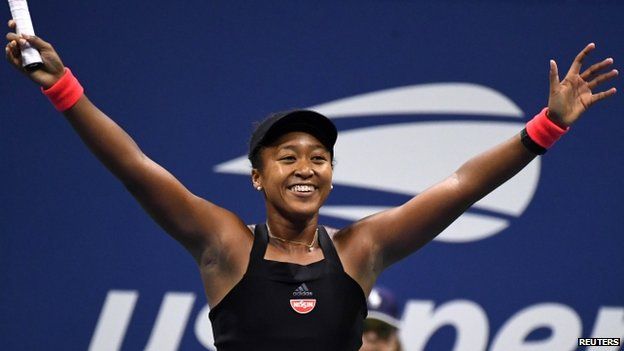Naomi Osaka through to US Open final with win over Madison Keys
- Published
- comments

Osaka was playing in her first Grand Slam semi-final
2018 US Open women's final |
|---|
Venue: Flushing Meadows, New York Date: Saturday, 8 September Time: 21:00 BST |
Coverage: Live radio coverage on BBC Radio 5 live sports extra; live text commentaries on the BBC Sport website. |
Naomi Osaka has become the first Japanese woman to reach a Grand Slam final after beating American Madison Keys to set up a meeting with Serena Williams at the US Open.
Osaka, 20, had never beaten Keys in their previous three meetings, but won 6-2 6-4 in New York.
The 20th seed saw off 13 break points and clinically took those which came her way.
She meets 23-time Grand Slam champion Williams at 21:00 BST on Saturday.
Asked how she felt during the match, Osaka said: "This is going to sound really bad… but I was just thinking - I really wanted to play Serena. Because she's Serena."
Williams eased past Latvia's 18th seed Anastasija Sevastova in straight sets earlier on Thursday.
Osaka was just one year old when Williams won her first Grand Slam in 1999.
Osaka feeling at home in New York
Osaka's reputation as one of the most talented younger players on the women's tour has grown on the back of a superb year which saw her win a first WTA title in Indian Wells and then earn a notable win over 36-year-old Williams in Miami a week later.
Now she has another chance to beat Williams after reaching her first Grand Slam final in New York - a city which has personal significance for the world number 20.
After being born in Japan, Osaka moved to New York aged three and spent her formative years there before her family relocated to Florida.
The dual-citizen says going to Japan feels like a "super-awesome vacation" rather than home, but will have the hopes of a nation behind her when she faces her childhood idol Williams.
And it will be a double celebration in the Asian country this weekend if Kei Nishikori beats 13-time Grand Slam champion Novak Djokovic in the men's semi-finals on Friday.
Unlucky 13 for Keys
Keys had 13 break points in the match but did not convert any
Keys, seeded 14th, was aiming to reach the final of her home Grand Slam for the second successive year and then go on to avenge last year's defeat by fellow American Sloane Stephens.
She had her chances against Osaka, but paid the price for not being to convert them.
Partly that was down to Osaka's fight, partly down to Keys' own naivety and profligacy at key moments.
Keys was unable to take any of four break points for a 3-1 lead in the first set, Osaka saving the final with a 109mph body serve and then seizing the momentum to break Keys in the next game.
That inability to grasp an early advantage felt costly - and so it proved.
Keys continued to pile pressure on Osaka's serve but missed two more break points, while the Japanese had no such issues, breaking to love in the next game and then serving out the opener after being taken to deuce.
It was the same story in the second set.
Keys pushed Osaka to the brink in the second game, missing six more break points in a 12-minute, 22-point battle.
Resilience, belief and composure helped Osaka through those difficult moments and, after seeing off a 13th break point for a 5-3 lead, served out the final game with little difficulty.
Analysis - Osaka a picture of composure
BBC Sport tennis correspondent Russell Fuller
Osaka felt as if she was "visibly shaking" but appeared a picture of composure as she fought off all 13 of Keys' break points. She served for a place in her first Grand Slam final as if she had been doing so all her life.
Osaka absorbed the pace of Keys' shots extremely well, which is an excellent way to prepare for a meeting with Serena Williams.
The 20-year-old has happy memories of Flushing Meadows, as she used to train here soon after the family arrived from Japan. Her quirky, but wonderfully natural reply to questions sometimes leaves the Japanese media perplexed, but it marks her out as a little different.
Osaka has power in abundance and has very quickly developed a big-match temperament. But what a task she has in the final: Williams has 16 years more experience, and has played in 30 more Grand Slam singles finals.